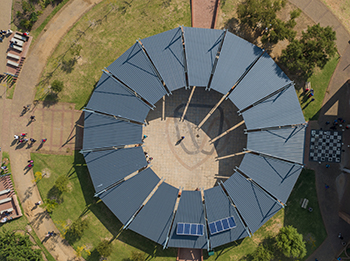Latest News Archive
Please select Category, Year, and then Month to display items
21 August 2019
|
Story Thabo Kessah
|
Photo Thabo Kessah
 Keafon Jumbam is gearing herself for the institutional Three Minute Thesis competition.
Keafon Jumbam is gearing herself for the institutional Three Minute Thesis competition.
Keafon Jumbam is a PhD candidate whose research on food and foxes has won her the first prize of R8 000 in the recent Faculty of Natural and Agricultural Sciences’ Postgraduate Flash Fact Competition. Her brief in the competition was to
summarise her research in three minutes, using only one static slide.“The competition started at departmental level on both campuses. The idea was that the best student in each department is then selected to go for the faculty-level competition on the Bloemfontein Campus. Summarising the entire research into three minutes is no easy feat, but a great way to gauge how well one has mastered your work,” she said.
Far-reaching research
“Thought-provoking presentations on research, ranging from technology to track academic progress, traditional medicine as alternatives to expensive prescriptions, and suggesting insects as food alternatives to curb hunger in this era of severe droughts and food shortages. The competition was tough, but it highlighted the level of research competitiveness on the Qwaqwa Campus. I hope that more students will join in such opportunities to build themselves up and to showcase our research output as Qwaqwa students,” added Jumbam from the
Department of Zoology and Entomology.
Institutional finals
Her next challenge is the institutional competition to be held on 23 August 2019, which could qualify her for the national competition.
Renewable energy systems an economical investment for the UFS
2017-06-14

The Qwaqwa Campus Arena equipped with freestanding
roof solar panels.
Photo: iFlair Photography
Renewable energy systems are said to be very expensive to implement initially, but in the long run they provide high economic returns.
With their decision to install renewable energy, the University of the Free State Department of Facilities Planning has now also adopted this innovative technology. They have chosen less capital-intensive solar power-generating options to generate electricity in various buildings and parking areas on all three UFS campuses.
“As per the UFS Energy Management Policy, all designs incorporate efficient, renewable energy sources varying from LED lights to solar power,” says Anton Calitz, Electrical Engineer in University Estates’ Department of Facilities Management.
South Campus taking the lead in renewable energy usage
In December 2016, a total of 26 solar-driven LED street-light poles were installed at the recently built Legae Residence’s parking area and the perimeter security area on the South Campus. This low-maintenance system improves security after dark and is independent of the national power supply, which is an important advantage during power outages. With no requirements for major earthworks and cable setting, operational costs are reduced.
The recently built infrastructure also takes pride in being the first to have a greywater system installed. This system will also be installed at three other residences on the Bloemfontein Campus in 2017. Greywater is made up of bath, shower, and bathroom sink water. The water is reused for toilet flushing, as well as for irrigation purposes.
Various UFS electrical operations to depend on solar power
On the Bloemfontein and Qwaqwa Campuses, the computer laboratories as well as the Thakaneng Bridge Student Centre and the projected Afromontane Research Centre will be equipped with freestanding roof solar solutions during 2017. These systems are designed to operate independently of the power grid (Eskom).
The systems only operate during sunlight hours when the PV solar panels are heated by the sun, making them suitable for operations such as ventilation fans, water pumps, and small circulation pumps for solar thermal water-heating systems.